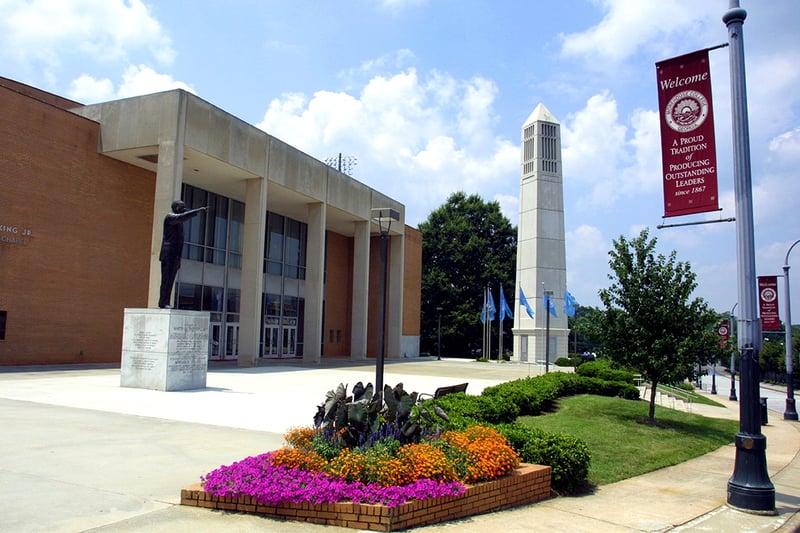- About
- Academics
- Admissions & Aid
- Life
- Research
- News & Events

Home
> Life
> Locations
> Mlk chapel
> Mlk chapel | gandhi king ikeda institute
Gandhi-King Ikeda Institute
Mohandas Karamchand Gandhi has bequeathed us a roadmap that has been tested and proven workable within and between nation states. Our American Moses, Martin Luther King Jr., has employed the roadmap in a fashion that further confirms the reliability of the Gandhian bequest to the world. The Gandhian nonviolent method was user friendly in the South African crisis effectively addressed by Nelson Mandela’s government to end the more than fifty years of apartheid oppression. Daisaku Ikeda has effectively used Gandhian and Kingian nonviolent methods to democratize and internationalize the imperialistic military state of Japan since 1960.
The most convincing sanctions for the effective use of nonviolent approaches to conflict resolution are seen in the diplomacy of the United Nations, and the state departments of all nations. The nonviolent diplomatic philosophies have been demonstrated by many world leaders such as Mother Teresa, Jesse Jackson, Pope John Paul II, Jimmy Carter, Mary McLeod Bethune, Baclav Havel, Johnnie Coleman, Marian Wright Edelman, Chief Albert Luthuli, Desmond Tutu, and Han Park.
- 1.) TO SERVE as a conference and multicultural Institute, a place to organize international and community based forums within and sponsored by the Martin Luther King Ir. International Chapel, to discuss a variety of perspectives affecting our common humanity. These could include such issues as community disintegration, denominationalism, enslavement, environmental injustice, ethnic cleansing, hate crimes, healing, inadequate schools, poverty, privileged markets, racism, school violence, the unity of science and religion, sexism, societal fragmentation, spirituality, terrorism, unemployment, unequal access to higher education, war, the prison industrial complex, and xenophobia. A large variety of groups crossing all cultural, economical, educational, gender, lifestyle, national, racial, and religious boundaries will discover new bases for the common ground between us. This Institute will inspire a more profound sense of domestic and international civility and humanity, helping us to appreciate that we are geographically one and are becoming spiritually one. Such diplomacy is reachable as a noble end of reconciling diversity toward which we should strive.
- 2.) TO MAKE KNOWN the life, work, and philosophies of Martin Luther King Ir., Howard Thurman, Benjamin Mays, Floyd McKissick, Samuel Woodrow Williams, Mordecai Wyatt lohnson, George Kelsey, William Jefferson White, Charles T. Walker, Charles Radford Lawrence, James Madison Nabrit, and with Mohandas K. Gandhi as the greatest world leader of the Twentieth Century, and Daisaku Ikeda as the contemporary embodiment of the philosophy of nonviolence institutionalized internationally.
- 3.) TO HONOR Kasturbai Gandhi for her singular, unsung contribution of role modeling and tutoring her husband in the practice of nonviolence. This will inaugurate a tradition of honoring women whom The Mahatma felt had a natural predisposition to providing nonviolent leadership.
- 4.) TO EXPLORE possibilities of exchanging visiting scholars and students from India and other countries who are experts on and interested in the application of philosophies of nonviolence internationally.
- 5.) TO BE A CONDUIT for partnerships and coordinated efforts of domestic and international organizations dedicated to reconciliation work. Some of these partners will be the Carter Center, the Peace Corps, the Fellowship of Reconciliation, Soka Gakki International (Buddhist), the Atlanta Masjid of Al Islam, Science and Spirit Magazine, Holistic Health Magazine, the Morehouse Andrew Young Center for Global Leadership, the India Council of Cultural Relations (New Delhi), the Gandhi Hamer King Center (Denver), UNESCO, Operations Crossroads Africa, the American Friends Services Committee, the Highlander Institute, the George Mason Institute for Conflict Resolution, the Southern Poverty Law Institute, Oxfam America, the Synthesis Dialogues, Council for the Parliament of World Religions, Association for Global New Thought, the Appeal of the Nobel Peace Prize Laureates Foundation, the Knotted Gun Project, and the Indian American Culture Association of Atlanta, and the Tikkun Community.
- 6.) TO ASSIST in the fulfillment of Resolution GA/9500, unanimously adopted by the 55th plenary meeting of the United Nations General Assembly, November 10, 1998. The resolution called for the International Decade for a Culture of Peace and Nonviolence for the Children of the World (2001-2010), with the year 2000 being a year of education. This includes the inauguration of “A Season of Nonviolence” annually, (January 30 – April 4), a period between the assassination dates of Gandhi and King, respectively.
- 7.) TO OFFER consultancy and guidance to institutions and individuals engaged in the study and research of nonviolence for problem solving. We would actively promote the introduction of foundation courses on Gandhian, Kingian, and lkedian philosophies in educational institutions, and facilitate a shift in the attitude of the print and electronic media towards rooting out the culture of violence by generative and creative kinds of nonviolence.
- 8.) TO UNDERTAKE the production and distribution of literature on nonviolence, peace, Gandhi-King-Ikeda studies, comparative religion, tolerance, appreciation of differences, and diversity-maturity.
- 9.) TO DEVELOP a network of individuals and institutions engaged in the task of peace and justice education, conflict transformation, peace, and justice promotion activities.
- 10.) TO DEVISE suitable formats and programs to bring the arts, particularly performing arts / dramaturge-in-residence, in peace and justice promotion. We will also seek to develop a comprehensive web page on Mahatma Gandhi, Martin Luther King Jr., and Daisaku Ikeda. We propose to utilize The Gandhi-King-Ikeda Institute for Global Ethics and Reconciliation as an institutionalized forum linking practice, knowledge, and service. Our goal is to help develop thoughtful servant-scholar leaders who think and act differently about problems of oppression and insensitivity which tend to be examined within narrow contexts with little attention paid to their complex and often paradoxical generalities around the world. This program emphasis would further assist the dean of the Chapel and the other College offices in the theological and intellectual exploration of vocation with the future ordained and lay leadership.